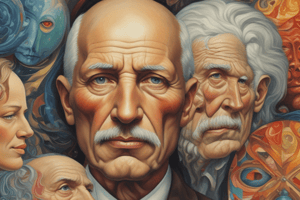Podcast
Questions and Answers
What did Carl Jung refer to as the mask we adopt?
What did Carl Jung refer to as the mask we adopt?
persona
According to Carl Jung, which of the following best serves the goal of self-realization?
According to Carl Jung, which of the following best serves the goal of self-realization?
- Extroversion
- Introversion
- Balance between extroversion and introversion (correct)
- None of the above
What coping strategy is Imogene using when she clings to her parents for affection during anxiety?
What coping strategy is Imogene using when she clings to her parents for affection during anxiety?
moving toward people
Who developed social-cognitive theory?
Who developed social-cognitive theory?
What was the primary finding of the Minnesota Study of Twins Reared Apart?
What was the primary finding of the Minnesota Study of Twins Reared Apart?
Which defense mechanism is exemplified when Mike plays video games after not getting a job?
Which defense mechanism is exemplified when Mike plays video games after not getting a job?
What would Carl Jung suggest about Max's behavior in job interviews?
What would Carl Jung suggest about Max's behavior in job interviews?
What refers to the common psychological tendencies passed down through generations?
What refers to the common psychological tendencies passed down through generations?
What was the main idea behind Erik Erikson's theory of psychosocial development?
What was the main idea behind Erik Erikson's theory of psychosocial development?
A(n) ______ locus of control is the belief that our outcomes are outside of our control; an ______ locus of control is the belief that we control our own outcomes.
A(n) ______ locus of control is the belief that our outcomes are outside of our control; an ______ locus of control is the belief that we control our own outcomes.
What are the traits that are key components of the Five Factor Model?
What are the traits that are key components of the Five Factor Model?
Carl Jung's view of extroverted and introverted types serves as a basis for what?
Carl Jung's view of extroverted and introverted types serves as a basis for what?
In Albert Bandura's social-cognitive theory, behavior refers to?
In Albert Bandura's social-cognitive theory, behavior refers to?
According to Sigmund Freud, an adult who exhibits certain behaviors is fixated in which stage of psychosexual development?
According to Sigmund Freud, an adult who exhibits certain behaviors is fixated in which stage of psychosexual development?
Who developed the first comprehensive theory of personality?
Who developed the first comprehensive theory of personality?
What concept suggests that people choose to move to places compatible with their personalities and needs?
What concept suggests that people choose to move to places compatible with their personalities and needs?
Cognitive processes refer to?
Cognitive processes refer to?
Hans and Sybil Eysenck viewed people as having which specific personality dimensions?
Hans and Sybil Eysenck viewed people as having which specific personality dimensions?
Who believed that our personality traits are influenced by our genetic inheritance?
Who believed that our personality traits are influenced by our genetic inheritance?
What is the main idea of the behavioral perspective on personality?
What is the main idea of the behavioral perspective on personality?
What is the developmental task of Erik Erikson's seventh stage of psychosocial development?
What is the developmental task of Erik Erikson's seventh stage of psychosocial development?
What is the advantage of applying learning approaches to the study of personality?
What is the advantage of applying learning approaches to the study of personality?
Who attempts to explain our personality by identifying our stable characteristics and ways of behaving?
Who attempts to explain our personality by identifying our stable characteristics and ways of behaving?
How would Carl Jung describe Eli, who seeks attention and acts before thinking?
How would Carl Jung describe Eli, who seeks attention and acts before thinking?
What is composed of a series of true and false questions to establish an individual's clinical profile?
What is composed of a series of true and false questions to establish an individual's clinical profile?
According to Abraham Maslow, what is the highest need?
According to Abraham Maslow, what is the highest need?
Flashcards are hidden until you start studying
Study Notes
Key Concepts in Personality Psychology
- Persona: A term coined by Carl Jung representing the social mask or identity people adopt in public.
- Self-Realization: Achieved through a balance of extroversion and introversion, according to Carl Jung.
Coping Strategies
- Moving Toward People: Imogene exemplifies this coping strategy by seeking affection and reassurance from her parents during times of anxiety.
Foundational Theories
- Social-Cognitive Theory: Developed by Albert Bandura, emphasizing the role of observational learning and social influence on behavior.
- Minnesota Study of Twins: Found that identical twins display very similar personalities regardless of being raised together or apart.
Psychological Defense Mechanisms
- Regression: Shown by Mike when he retreats to childhood behaviors (playing video games) after job rejection.
Carl Jung's Insights
- Professional Persona: Max illustrates Jung’s concept when he switches from a relaxed social demeanor to a formal one for job interviews.
- Collective Unconscious: Refers to psychological tendencies inherited across generations.
Psychosocial Development
- Erik Erikson's Theory: Personality evolves throughout an individual's lifespan, with each stage presenting unique challenges.
- Generativity vs. Stagnation: The focus of Erikson's seventh stage where individuals contribute to society and family.
Locus of Control
- External vs. Internal Locus: External locus believes outcomes are influenced by external factors, while internal locus believes individuals can control their own outcomes.
Five Factor Model
- Consists of five key traits: openness, conscientiousness, extroversion, agreeableness, and neuroticism, which summarize personality structures.
Theoretical Contributions
- Myers-Briggs Type Indicator: Based on Jung's theories of extroversion and introversion categories.
- Behavioral Perspective: Personality is shaped by reinforcements and consequences from the environment.
- Trait Theorists: Focus on identifying stable characteristics and behaviors as the basis for personality.
Cognitive Processes
- Encompasses learned beliefs and expectations that influence behavior.
Eysenck's Dimensions
- Personality Dimensions: Hans and Sybil Eysenck emphasized extroversion/introversion and neuroticism/stability as key dimensions of personality.
Personality Assessment
- Minnesota Multiphasic Personality Inventory (MMPI): A structured assessment tool using true/false questions to outline an individual's clinical profile.
Maslow's Hierarchy
- Self-Actualization: The pinnacle of human development according to Abraham Maslow, representing the realization of an individual's potential.
Studying That Suits You
Use AI to generate personalized quizzes and flashcards to suit your learning preferences.




